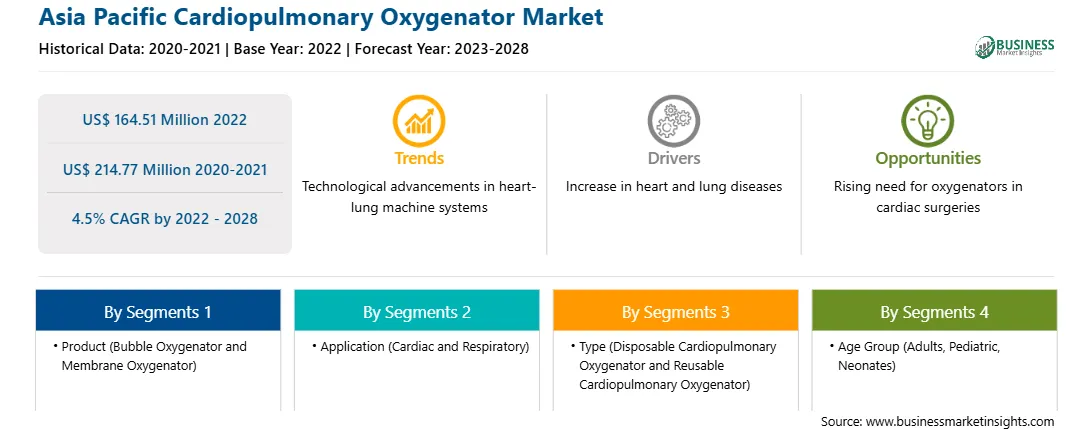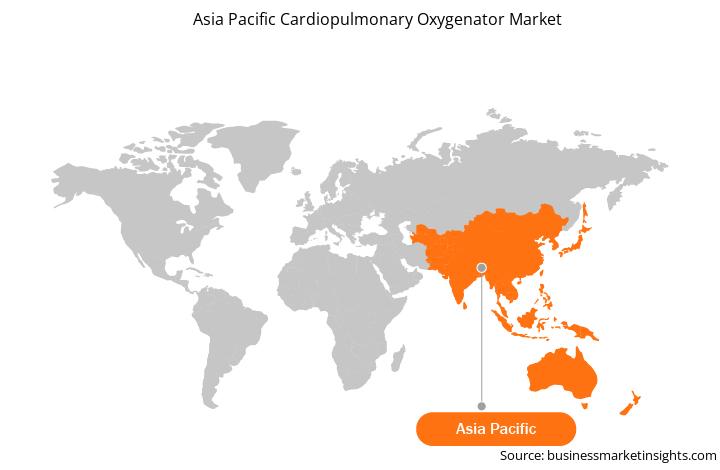Surgical procedures are necessary for managing health conditions such as cardiovascular diseases and lung disorders. In some medical cases, no alternative works without surgery. Per an article published in the National Center for Biotechnology Information (NCBI) in 2020, ~310 million major surgical operations are carried out each year worldwide, of which 50–60 million are performed in the US. The high demand for cardiovascular surgeries can be attributed to the increase in the incidence of cardiovascular diseases in the aging population. Further, lung transplantation may be the only helpful treatment option for patients experiencing serious lung damage and non-resolving COVID-19-associated respiratory failure. Thus, with the growing number of cardiovascular and lung transplant surgeries, the demand for cardiopulmonary oxygenators is also on the rise in the region.
According to the WHO, the percentage of people aged 60 and above is estimated to reach 22% by 2050 from 12% in 2015. Cardiovascular diseases continue to be the leading cause of death among adults over the age of 65. Aging can cause changes in the heart and blood vessels, increasing the risk of developing these diseases. Therefore, the prevalence of cardiovascular diseases among geriatric populations is contributing to the growth of the cardiopulmonary oxygenators market.
The Asia Pacific cardiopulmonary oxygenator market is segmented into China, Japan, India, South Korea, Australia, and the Rest of Asia Pacific. China held the largest market share in 2021, and India is expected to register a significant CAGR in the market.
Despite progress in the availability of effective and safe prevention strategies worldwide, cardiovascular disease (CVD) remains the leading cause of death and premature death globally. According to the Global Burden of Diseases Study, in 2019, out of the total 18.6 million CVD deaths worldwide, 58% of them occurred in Asia. As the continent with the largest population and greatest diversity of cultures, ethnicities, socioeconomic status, and health care systems, Asia faces many challenges in CVD prevention and treatment. The growth of the market is mainly attributed to the increasing prevalence of atrial fibrillation (AF) in China, the increasing burden of various other heart diseases, and the rising geriatric population across the region are all expected to support market growth. As per the prediction done by World Heart Federation, cardiovascular events like ischemic heart disease and stroke are expected to rise by 50% among the Chinese population between 2010 and 2030. The Indian Heart Association stated that 50% of heart attacks occur under the age of 50, while 25% of the heart attacks occur under 25 years of age. Both the male and female populations in the country equally exhibit the risk of developing heart disease. Moreover, stroke is one of the atrial fibrillation's frequent and devastating complications. About one-third of the patients with atrial fibrillation are asymptomatic and atrial fibrillation may go undetected in the patients until symptoms develop. As the oxygenator supplies oxygen, by removing carbon dioxide, to the artery during heart surgeries therefore the heart is relieved from performing pumping duties. Thus growing prevalence of cardiovascular disease in the region is fueling the demand for cardiopulmonary oxygenator market.
As per the Frontier Media Public Health report published in June 2022, the most recent Chinese national survey of COPD showed that China accounted for almost 25% of all COPD cases globally. As compared with the survey results 10 years ago, the prevalence of COPD has increased by 67% in the aged 40 years or older group and has reached epidemic proportions. Moreover, asthma is a major public health challenge in the country, and it affects millions of people, according to the National Library of Medicine, the prevalence of asthma was 4.2% which represented 45.7 million people in the country in 2019, this has further increased the demand for respiratory inhalers. Moreover, the beginning of the COVID-19 pandemic from Wuhan city in China had led to the development of severe acute respiratory syndrome among the large population which in turn created the demand for the cardiopulmonary oxygenator market. Moreover, during the COVID-19 pandemic India is the second most affected country in the region which the second highest number of cases with different waves of COVID which has raised the growth of cardiopulmonary oxygenator market.
Therefore, growing prevalence of cardiovascular as well as respiratory diseases in the population of Asia Pacific is fueling the demand for cardiopulmonary oxygenator.
Strategic insights for the Asia Pacific Cardiopulmonary Oxygenator provides data-driven analysis of the industry landscape, including current trends, key players, and regional nuances. These insights offer actionable recommendations, enabling readers to differentiate themselves from competitors by identifying untapped segments or developing unique value propositions. Leveraging data analytics, these insights help industry players anticipate the market shifts, whether investors, manufacturers, or other stakeholders. A future-oriented perspective is essential, helping stakeholders anticipate market shifts and position themselves for long-term success in this dynamic region. Ultimately, effective strategic insights empower readers to make informed decisions that drive profitability and achieve their business objectives within the market.

| Report Attribute | Details |
|---|---|
| Market size in 2022 | US$ 164.51 Million |
| Market Size by 2028 | US$ 214.77 Million |
| CAGR (2022 - 2028) | 4.5% |
| Historical Data | 2020-2021 |
| Forecast period | 2023-2028 |
| Segments Covered |
By Product
|
| Regions and Countries Covered | Asia-Pacific
|
| Market leaders and key company profiles |
|
The geographic scope of the Asia Pacific Cardiopulmonary Oxygenator refers to the specific areas in which a business operates and competes. Understanding local distinctions, such as diverse consumer preferences (e.g., demand for specific plug types or battery backup durations), varying economic conditions, and regulatory environments, is crucial for tailoring strategies to specific markets. Businesses can expand their reach by identifying underserved areas or adapting their offerings to meet local demands. A clear market focus allows for more effective resource allocation, targeted marketing campaigns, and better positioning against local competitors, ultimately driving growth in those targeted areas.

The Asia Pacific cardiopulmonary oxygenator market is segmented into product, application, type, age group, end use, and country. Based on product, the market is bifurcated into membrane oxygenator and bubble oxygenator. The membrane oxygenator segment held a larger market share in 2022.
Based on application, the market is bifurcated into cardiac and respiratory. The cardiac segment held a larger market share in 2022. Further, cardiac is segmented into acute myocardial infarction, myocarditis, post-transplant complications, decompensated cardiomyopathy, and others. Further, respiratory is segmented into respiratory failure, acute respiratory distress syndrome, pulmonary embolism, pneumonia, and COVID-19.
Based on type, the market is bifurcated into reusable cardiopulmonary oxygenators and disposable cardiopulmonary oxygenators. The reusable cardiopulmonary oxygenators segment held a larger market share in 2022.
Based on age group, the market is segmented into adults, pediatric, and neonates. The adults segment held the largest market share in 2022.
Based on end use, the market is segmented into hospitals and clinics, ambulatory surgical centers, and others. The hospitals and clinics segment held the largest market share in 2022.
Based on country, the market is segmented into Australia, China, India, Japan, South Korea, and the Rest of Asia Pacific. China dominated the market share in 2022.
Getinge AB; LivaNova Plc; Medtronic Plc; Terumo Corp; Eurosets SRL; Nipro Medical Corp; Microport Scientific Corp; Chalice Medical Ltd; and Fresenius Medical Care AG & Co KGaA are the leading companies operating in the cardiopulmonary oxygenator market in the region.
The Asia Pacific Cardiopulmonary Oxygenator Market is valued at US$ 164.51 Million in 2022, it is projected to reach US$ 214.77 Million by 2028.
As per our report Asia Pacific Cardiopulmonary Oxygenator Market, the market size is valued at US$ 164.51 Million in 2022, projecting it to reach US$ 214.77 Million by 2028. This translates to a CAGR of approximately 4.5% during the forecast period.
The Asia Pacific Cardiopulmonary Oxygenator Market report typically cover these key segments-
The historic period, base year, and forecast period can vary slightly depending on the specific market research report. However, for the Asia Pacific Cardiopulmonary Oxygenator Market report:
The Asia Pacific Cardiopulmonary Oxygenator Market is populated by several key players, each contributing to its growth and innovation. Some of the major players include:
The Asia Pacific Cardiopulmonary Oxygenator Market report is valuable for diverse stakeholders, including:
Essentially, anyone involved in or considering involvement in the Asia Pacific Cardiopulmonary Oxygenator Market value chain can benefit from the information contained in a comprehensive market report.